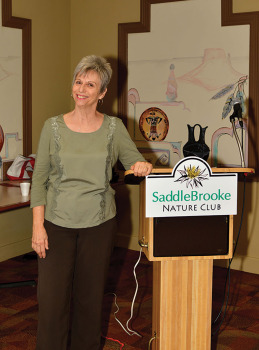Pam Boedeker
The Coyote Room was filled to capacity for the November meeting of SaddleBrooke Nature Club. New residents and long-time residents were all interested in avoiding or treating those poisonous bites, stings and punctures that occur here in our Sonoran Desert.
The speaker, Liz Barta, RN, has been with the University of Arizona College of Pharmacy’s Arizona Poison and Drug Information Center for 12 years. 1-800-222-1222 is available free to everyone no matter where they live. Callers remain anonymous.
The call center averages 135 calls a day! It is open 24/7.
Qualified pharmacists take calls and various specialists are available to help with questions about all poisons. While questions about scorpion stings are the most common, other questions range from drug interaction, mushrooms, household chemicals, rattlesnake bites, side effects of herbal supplements, over the counter medications and much more.
Ninety percent of the time a call to the Poison Center can avoid a trip to the hospital. Most cases can be treated at home with washing the area, applying cool compresses and over the counter pain relievers. However, people have different reactions to bites and stings. If there is difficulty breathing, seizures or unconsciousness, call 911 then the Poison Center. They can track your treatment and help the ER with diagnosis and treatment. The Poison Center has an Anti-Venom Index which can locate whatever is needed.
Arizona is the Venomous Capital of the United States! Ms. Barta gave a photo presentation of many of Arizona’s poisonous creatures and sometimes the wounds they create including; The Black Widow (only the female bites), Arizona Brown (no Brown Recluse are in Arizona), Scorpions (30 species in Arizona), Gila Monsters, ants, wasps, caterpillars, snakes and bees. Interestingly, bees are the most dangerous and cause the most deaths.
The Arizona Poison and Drug Information Center has a wealth of information to share even if you have not been stung or bitten. If you want information about a medication, a plant that might be poisonous or preventative measures call 1-800-222-1222.
The December 8 speaker for SaddleBrooke Nature Club will be Jean Groen who will discuss Edible Plants of the Desert.
For further information check the website at www.SaddleBrookeNatureClub.com.

